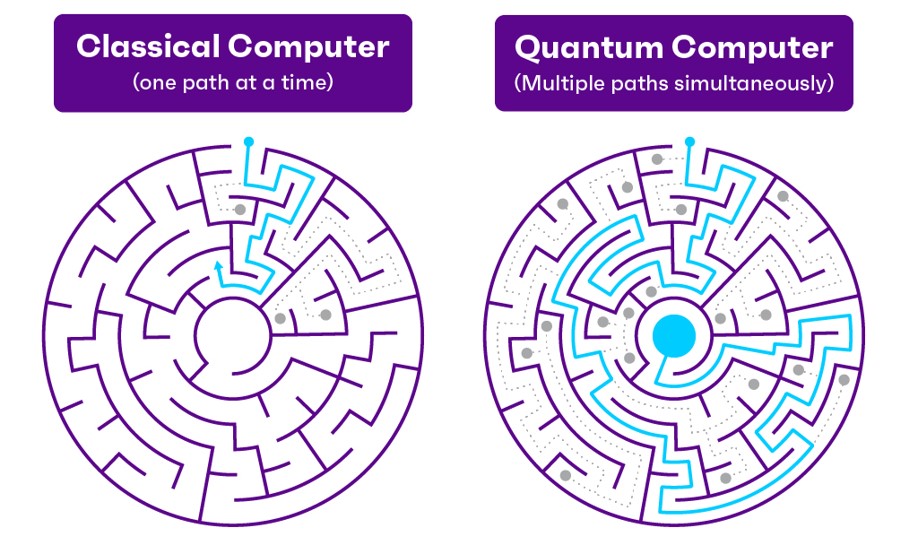This year – the Year of Quantum, marks a pivotal moment for quantum technology. New breakthroughs are not only astounding scientists but are also fundamentally reshaping the landscape of digital security for everyone, although it isn’t publicly obvious just yet.
For years, the promise and peril of quantum computing have loomed. The peril, specifically, is its potential to dismantle the very encryption that safeguards every aspect of our digital lives.
The intersection of digital security and quantum computing has never been more relevant to every individual and organisation; a week ago, scientists proved that a quantum computer can unconditionally outperform classical computers. It’s somewhat ironic that unconditional ‘quantum supremacy’ has been showcased just as Cyber Security Awareness Month rolls in, during the Year of Quantum.
But why is this such a big deal?
Traditional algorithms that keep data safe from hackers and which underpin much of today’s online security, rely on mathematical problems that are incredibly difficult for classical computers to solve. However, a quantum computer can theoretically break these systems that have been built over the last half a century, almost instantly.
“A future [quantum computer] will have the power to break widely used public-key algorithms … which underpin much of today’s digital security.” – Andreas Baumhof, the Vice President Quantum Technologies at Quintessence Labs writes – “Shor’s algorithm illustrates why. This quantum algorithm can efficiently factor large integers—a task that is practically impossible for classical computers.”
How much time do we have?
Quantum supremacy is unquestionably an urgent threat. However, it is now clear that the threat has moved beyond the realms of sci-fi and theory. A paper pre-print preliminarily publicised last month, “Demonstrating an unconditional separation between quantum and classical information resources” showed how UT Austin researchers solved a randomised, complex computational task, via a quantum computer, using up to ~25x less computational memory than a classical computer would use.
This directly demonstrates that a correctly utilised quantum computer can unconditionally solve computational tasks, which classical computing simply cannot match. This threshold was previously hypothesised to be at least a few years, to a decade away, but this pre-print research paper, sets a new benchmark.
The "Harvest Now, Decrypt Later" Threat
As Andreas Baumhof put it, once quantum computers which can decrypt information exist, “[our old] algorithms will no longer provide protection,” continuing to write that “the urgency is compounded by the “harvest now, decrypt later” risk— adversaries are already storing encrypted data with the intent to decrypt it once quantum computers mature. Sensitive information requiring long-term confidentiality … is therefore at risk today.”
It is a ticking time bomb.
There’s no way to defuse it and turns out there is much less time than previously thought.
An article published by the Australian Signals Directorate, echoed these concerns, recommending that organisations cease using traditional data encryption methods by the end of 2030, emphasising that "deploying protections against a CRQC may take longer than expected.”
Action is crucial now.
Post-Quantum Cryptography: The Shield Against Tomorrow's Threats
The good news is that solutions are rapidly emerging. Upcoming post-quantum cryptography frameworks present new, hardy algorithms designed to resist both classical and quantum attacks.
“The development of post-quantum cryptographic algorithms aims to create robust encryption methods that remain secure even in the face of quantum attacks.” – Cogito Group (Secure SME).
Quintessence highlights other powerful tools, such as Quantum Random Number Generators (QRNGs).
QRNGs leverage “the inherent unpredictability of quantum processes to deliver true, verifiable randomness—an essential foundation for secure encryption keys.”
The shift to post-quantum cryptography will affect everyone, but what affects everyone, opens vast arrays of new opportunities.
Join the Discussion: Intersection of Advanced Technologies Event
The convergence of quantum applications and cybersecurity, especially now that quantum supremacy can be unconditionally showcased, presents unprecedented opportunities and strategic challenges.
To delve deeper into these crucial developments and Canberra's unique role, join the "Intersection of Advanced Technologies" event. Hear from leaders like LTGEN Susan Coyle AM, CSC, DSM, Fernando Alves (Quantum Australia), and Arvind Ramana (Australian Space Agency) as they discuss market opportunities, national security, and building the workforce of the future.
Connect with innovators and seize opportunities in reshaping the digital future. Be a pioneer in the global effort to adopt complete PQC.
The race to secure the digital future is almost over.

